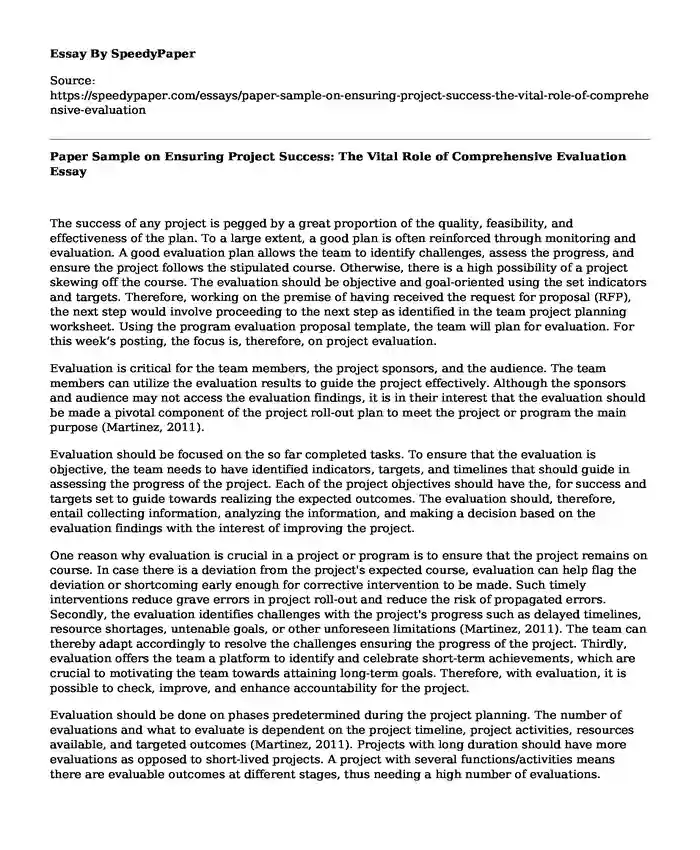
| Type of paper: | Essay |
| Categories: | Planning Project management |
| Pages: | 3 |
| Wordcount: | 626 words |
The success of any project is pegged by a great proportion of the quality, feasibility, and effectiveness of the plan. To a large extent, a good plan is often reinforced through monitoring and evaluation. A good evaluation plan allows the team to identify challenges, assess the progress, and ensure the project follows the stipulated course. Otherwise, there is a high possibility of a project skewing off the course. The evaluation should be objective and goal-oriented using the set indicators and targets. Therefore, working on the premise of having received the request for proposal (RFP), the next step would involve proceeding to the next step as identified in the team project planning worksheet. Using the program evaluation proposal template, the team will plan for evaluation. For this week’s posting, the focus is, therefore, on project evaluation.
Evaluation is critical for the team members, the project sponsors, and the audience. The team members can utilize the evaluation results to guide the project effectively. Although the sponsors and audience may not access the evaluation findings, it is in their interest that the evaluation should be made a pivotal component of the project roll-out plan to meet the project or program the main purpose (Martinez, 2011).
Evaluation should be focused on the so far completed tasks. To ensure that the evaluation is objective, the team needs to have identified indicators, targets, and timelines that should guide in assessing the progress of the project. Each of the project objectives should have the, for success and targets set to guide towards realizing the expected outcomes. The evaluation should, therefore, entail collecting information, analyzing the information, and making a decision based on the evaluation findings with the interest of improving the project.
One reason why evaluation is crucial in a project or program is to ensure that the project remains on course. In case there is a deviation from the project's expected course, evaluation can help flag the deviation or shortcoming early enough for corrective intervention to be made. Such timely interventions reduce grave errors in project roll-out and reduce the risk of propagated errors. Secondly, the evaluation identifies challenges with the project's progress such as delayed timelines, resource shortages, untenable goals, or other unforeseen limitations (Martinez, 2011). The team can thereby adapt accordingly to resolve the challenges ensuring the progress of the project. Thirdly, evaluation offers the team a platform to identify and celebrate short-term achievements, which are crucial to motivating the team towards attaining long-term goals. Therefore, with evaluation, it is possible to check, improve, and enhance accountability for the project.
Evaluation should be done on phases predetermined during the project planning. The number of evaluations and what to evaluate is dependent on the project timeline, project activities, resources available, and targeted outcomes (Martinez, 2011). Projects with long duration should have more evaluations as opposed to short-lived projects. A project with several functions/activities means there are evaluable outcomes at different stages, thus needing a high number of evaluations.
Resources available for the evaluation would range from human capacity, monetary resources, and evaluation frameworks or protocols. A process is as good as the quality of deployed resources. It should be done by competent members using evaluation protocols that are conversant and adaptable to the project. Also, external audits are encouraged occasionally since they are less affected by evaluator bias. The team members are conversant with what, how, and when evaluation should be done.
Although the RFP is convincing, it is still a work in progress. The team will continue to improve, especially the objectives to ensure they are specific, achievable, and reasonable. Also, the team will also seek to improve any other areas of the FRP that may appear wanting progressively.
Reference
Martinez, S. (2011). Impact evaluation in practice. World Bank Publications
Cite this page
Paper Sample on Ensuring Project Success: The Vital Role of Comprehensive Evaluation. (2023, Dec 07). Retrieved from https://speedypaper.net/essays/paper-sample-on-ensuring-project-success-the-vital-role-of-comprehensive-evaluation
Request Removal
If you are the original author of this essay and no longer wish to have it published on the SpeedyPaper website, please click below to request its removal:
- Growing Threat - Free Essay Dedicated to Terrorism
- Derek Jeter Essay Sample
- Marketing Essay Example: Product Placement
- Multiple Sclerosis and Fitness, Essay Example
- Essay Sample on Purchasing Portfolio Theory
- Paper Example. A Pivotal Year for European Airlines
- Essay Sample: The Objectives of Risk Management
Popular categories




